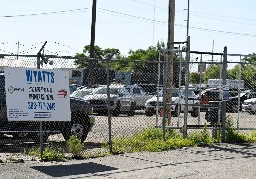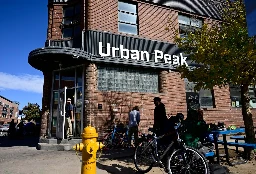Search
Inside Carrie Walton Penner’s first year as Broncos owner and her vision for what comes next
Broncos owner Carrie Walton Penner doesn’t have a day-to-day title like CEO, but her impact on the franchise is pronounced — and it’s growing as the ownership group moves into its secon…

ARTICLE TEXT
JL Skinner relished the chance to be a role model.
The Broncos rookie safety grew up going to the Boys & Girls Club in Southern California. He credits a lot of his development as a kid to the hours, days and weeks he spent there after school and in the summers.
So in June, he jumped at the opportunity to join other rookies for a day trip to the Denver Broncos Boys & Girls Club.
“It felt like going back home for a little bit,” Skinner said.
Given his history, Skinner had a sense that he and the other Broncos youngsters would be the highlight of the day, probably the week, for the kids there. What he didn’t know when he got on the bus that morning, however, was that he would find a new role model, too.
At the start of the day, Broncos owner Carrie Walton Penner made her way from seat to seat, introducing herself to the newest members of the football team.
Intimidating, right? The wealthiest ownership group in American sports? The boss’s boss’s boss?
Actually, according to the sixth-round draft pick, not at all.
“She’s very down-to-earth, easy to talk to,” Skinner told The Post. “I really appreciate her for even coming with us on that trip because that shows how involved she is with us, the rookies and the team. It was really fun, very comfortable, not nerve-wracking at all.
“I look at her as a role model. … “Now I say ‘hi’ all the time. You can always go talk to her about anything. I had lunch with her, as well, and it was great to talk with her and build that connection.”
They know a little bit about each other now.
Broncos fans know a little bit, too, about the Walton-Penner Family Ownership Group. As the family hits its one-year anniversary of purchasing the franchise this month, fans and outsiders have become accustomed to occasionally hearing about ownership’s decisions and vision through CEO Greg Penner.
Inside the organization, however, Carrie Walton Penner has set about developing and executing that vision in ways ranging from player development to mental health and wellness, staff culture to philanthropy and community involvement, from newly minted draft picks to 40-year alumni and everything in between. Her office in the Centura Health Training Center might just be the franchise’s center point, not because of its position in a high-traffic area at the top of the second-floor steps or because edicts emanate outward, but because it is the place where Walton Penner keeps the notepad on which she is constantly writing questions to answer, ideas to explore, brains to pick, groups to gather and people to circle back with.
The evolution of this venerated NFL club is happening right here, right now. And it has Walton Penner’s fingerprints all over it.
“It feels like 10 years”
When Walton Penner and the rest of the new ownership group closed on the Broncos last August and arrived in town, they and many others thought they were about to watch Russell Wilson and Nathaniel Hackett engineer a turnaround after a long playoff drought.
Instead, of course, Denver struggled offensively out of the gates and the wheels eventually fell off in a 5-12 season. Hackett was fired after 15 games.
The to-do list got long in a hurry.
“It feels like it’s been maybe 10 years,” said Walton Penner on a late July morning as new coach Sean Payton got his team on the field for its first ramp-up workout. “We’ve had about a decade of learning consolidated into a really short time. … Coming in Aug. 10, everything was fully baked and underway. Training camp was underway. We were a couple days out from our first preseason game. We knew we had a lot to learn, but I had no idea how much we would learn and really how quickly we would learn such a range of things.”
Instead of taking time to get accustomed to how the club operated, football decisions started coming into view quickly. Instead of building on on-field momentum, questions swirled by the time the Broncos went to London in late October.
“The unfortunate season we had, it was a bit of a blessing in disguise because it allowed us to learn a lot more, faster,” Walton Penner said. “I feel like we did have multiple seasons and experienced what for some owners might take five seasons or 10 seasons to go through a lot of the range of things we went through last year.”
A bad year on the field and a subsequent coaching search take up time and resources, but the world also keeps turning. It didn’t take long after “landing day,” as Walton Penner referred to the new ownership group’s arrival in Denver, for her to start to identify the areas of the organization she wanted to get to know first.
“I was definitely open to figuring out what it looked like and then getting my feet on the ground and learning and understanding and then figuring out where it would be that I could have the greatest impact,” she said. “With Greg as the CEO, we knew coming into it that somebody needed to be in charge and it needed to be really clear who you go to if you need an answer. With him really being focused on the day-to-day and everything that comes up over the course of a week, it gave me a chance to really experience and think about and get to know the organization broadly and figure out some of those things.”
“A rare skill”
Walton Penner heard a familiar refrain from friends and colleagues as the sale process played out.
“You’re going into football?”
It’s not exactly the family business or a natural part of her own career arc.
Walton Penner, the daughter of Rob Walton and granddaughter of Walmart founders Sam and Helen Walton, has spent much of her professional career working in education policy in Colorado and around the country as the education program committee chair for the Walton Family Foundation. In recent years, she’s expanded that work to focus extensively on mental health, particularly among K-12 children and young adults.
She spent much of her time growing up in Colorado and as a football fan – more college than the NFL – but football was not the thing. Walton Penner, 52, graduated from Georgetown, earned a pair of master’s degrees at Stanford and went to work in a complicated, thorny, different state-by-state policy landscape.
“She’s committed to voice and committed to making decisions democratically,” said Marc Sternberg, who worked with Walton Penner for several years at the Walton Family Foundation and then founded A Street, an education venture capital company. “It’s not about rushing to an answer but about putting in the work to make sure the right voices are at the table.
“She rolls out of bed knowing how to make people feel heard, and that’s a rare skill.”
Over the years, her work and investment portfolio expanded into mental health initiatives, including BeMe, an app that helps provide young people mobile access to mental health resources.
“It really was this transition and expansion from education and wanting to make sure that every young person has access to an excellent education and then realizing there are so many things that a lot of young people come to school with, whether it’s hunger or unmet mental health needs,” she said. “I shifted into that area and really started investing in start-up companies that were, from my perspective, a lot more innovative and really trying to solve problems.”
She joined the Stanford University Board of Trustees and is a board member at The Aspen Institute and KIPP Foundation.
All of which is to say she had plenty on her plate without scoreboards and division standings and ACL injuries.
But as Walton Penner dug into the Broncos, a surprising realization surfaced about all those years of policy work and the way it shaped her approach and skillset.
“It translates incredibly well (to football),” she said. “Part of it is I bring in a unique way of thinking of education – everyone thinks differently. How are we applying that and thinking about that for our players in terms of our playbook? Are we making sure we’re thinking fully about how people learn and how they experience being a part of the Broncos?”
CONTINUED IN COMMENTS
Mixed-race family questioned at Denver airport sues Southwest Airlines, alleging “blatant racism”
Mary MacCarthy and her 10-year-old daughter, Moira, had just landed in Denver on Oct. 22, 2021m when they were met on the jet bridge by a Southwest Airlines employee and two Denver police officers.

A mixed-race family questioned by police at Denver International Airport two years ago over child trafficking allegations has sued Southwest Airlines in federal court, alleging “blatant racism” as the sole reason the carrier contacted authorities.
Mary MacCarthy and her 10-year-old daughter, Moira, had just landed in Denver on Oct. 22, 2021, when they were met on the jet bridge by a Southwest Airlines employee and two Denver police officers.
An airline employee, the mother and daughter learned, had reported them to police for suspected child trafficking (MacCarthy is white and her daughter is Black).
That call for suspicious activity, MacCarthy’s attorney alleged in the lawsuit, came “for no reason other than the different color of her daughter’s skin from her own.” Flight attendants did not even ask them about it on the flight, the family says.
Moira sobbed through the incident, her mother said, and the experience remains “extremely traumatic.” MacCarthy explained to police that she was, indeed, her daughter and showed identification. Officers finally let them go.
A Southwest Airlines spokesperson declined to comment on the lawsuit.
“This is the type of situation that mixed-race families and families of color face all the time while traveling,” MacCarthy told The Denver Post in 2021.
The lawsuit, filed Thursday in the U.S. District Court for the District of Colorado, demands a jury trial and other damages.
Denver Mayor Mike Johnston schedules first homeless encampment cleanup due to rat infestation
Mike Johnston's administration is moving ahead with its first homeless encampment cleanup scheduled for Friday because of a rat infestation, but Denver's new mayor acknowledged the city does not yet have a place for the people that must relocate to move into.

Mike Johnston's administration is moving ahead with its first homeless encampment cleanup scheduled for Friday because of a rat infestation, but Denver's new mayor acknowledged the city does not yet have a place for the people that must relocate to move into.
“This is the challenge of our current scenario,” Johnston said while speaking to reporters on Wednesday, “which is we don’t yet have units up and ready that we can move them to.”
The predicament demonstrates the need for his long-term plan, Johnston said, which is to amass supportive housing and to shift to a process of “decommissioning” encampments, rather than "sweeping" them.
His goal, he said, is to end the cycle seen in past years in which Denver’s encampment sweeps merely shuffled homeless residents from one city block to another. Instead, his priority is to simultaneously match people with a housing unit as their encampments shutter.
The mayor promised to personally visit any site the city decides to clean up before any encampment is closed.
Johnston’s administration agreed to clean up the site because of a significant rat infestation.
“So, we were very worried about the health and safety of the folks who were in that encampment as well as the surrounding neighborhood,” he said.
The city is providing all encampment sites seven days notice of a cleanup. It has partnered with a nonprofit experienced in conducting outreach with people living in encampments, he said, and has focused on informing people about the housing units the city is planning to provide in the future. The city is also deploying a wellness vehicle to provide mental and physical health support that “will be making regular visits” to encampments, he said.
Under a settlement agreement following a lawsuit, Denver must give at least seven days’ notice before a large-scale cleanup. However, the city can conduct the cleanup sooner if a public health or safety risk exists.
Since the seven-day notice is already required, the Johnston administration is merely following the timeline stipulated under the settlement. However, if the encampment faces a public health risk, then the Johnston administration has decided against conducting an earlier cleanup, which is permissible under the settlement.
It's not immediate clearly how many cleanups took place this year, but a recent audit said that, from Jan. 1 through June 30 of last year, the city completed 58 cleanups and canceled seven. Citing the city's database, the audit said cleanup dates listed several locations for a total of 74 locations cleaned. During the same period, the city's outreach teams visited active encampment sites more than 2,000 times and had nearly 13,000 encounters with homeless people.
Johnston was scheduled to visit the encampment on Thursday, but, as of Wednesday, he was not planning to attend the cleanup on Friday.
Last week, the mayor said Denver will not be closing encampments unless it meets at least one of three criteria: A significant public health or safety risk, infringement on a public right of way, or infringement of private property.
For encampments that don’t fit that bill, the city is focused on building relationships with the people living there and preparing them to move into supportive housing units when they become available, his administration said.
Johnston's main goal remains connecting people living in “unsheltered” homelessness — a term used for people sleeping outdoors or in public spaces — with housing units that also provide “wraparound” support services, such as behavioral health treatment and workforce training.
On his first full day in office, Johnston declared a state of local emergency regarding homelessness and announced a plan to move 1,000 people off of Denver’s streets and into housing before the year’s end. His team is trying to source four types of housing to meet that goal, with a priority on individual and private units. Those types of housing are rental units, hotel conversions, land for micro-communities — such as tiny homes — and industrial buildings.
There is progress in acquiring those spaces, the mayor said.
The administration is in the midst of “an intense sourcing” push and people are approaching the administration with potential sites for use in the initiative. The list of potential units is in the thousands, a promising start even if the majority turned out not to be a right fit, Johnston said.
Last week, the city announced the first acquisition that will be used to support his initiative with a hotel conversion that will bring in nearly 200 units of supportive housing.
The city announced plans to convert a Best Western hotel in northeast Denver into permanent supportive housing. The sale price of nearly $26 million will be covered through $11 million in DHA Delivers for Denver (D3) bond funds and a $16 million bridge loan.
“The acquisition of hotels for conversion to supportive housing helps expand the pipeline quickly by leveraging existing buildings,” HOST Executive Director Laura Brudzynski said in a news release.
As for funding his full initiative, Johnston said the city has applied for a state grant to support a navigation center and formally registered its intent to use Proposition 123. Johnston told The Denver Gazette the total cost, or estimated range, is not yet available. He has previously said the number could be significant based on what combination of supportive housing units the city secures.
When asked for his response to concern that scaling back sweeps leads to encampments sprawling or worsening in condition, Johnston said the administration is monitoring the issue and started trash collection at sites to help manage cleanliness. Johnston reiterated that not all trash is generated by people living in the encampments, but sometimes caused by people donating supplies that can’t be used.
“We’re watching carefully the number of encampments and the size of encampments,” he said.
Persistent segregation at Denver’s schools hurting Latinos, English learners, study finds
Denver’s schools are more segregated now than when forced busing ended almost 30 years ago, according to a new study released Monday.

Denver’s schools are more segregated than they were 50 years ago when the district was forced to bus students to integrate its campuses, according to a study released Monday.
Segregation reemerged in Denver Public Schools after busing ended 28 years ago, with Latino students — which make up more than half of the district’s students — and English learners — about a third of all DPS students — more likely to attend schools where the student population is mostly made up of students of color and those living in poverty, researchers found.
DPS campuses that mostly serve students of color and those from low-income families also have fewer resources and graduation rates, according to the study, which was commissioned by the Latino Education Coalition.
“While the results of this study are painful, I am not surprised,” Superintendent Alex Marrero said in a statement, adding, “It is vitally important that we leave no stone unturned in finding the root causes, even if the findings make us uncomfortable.”
DPS and the coalition issued a joint press release, saying that both organizations are working on another study to examine the factors that contributed to the resegregation.
The study was conducted by Kim Carrazco Strong of The Bueno Center for Multicultural Education at the University of Colorado Boulder and Craig Peña, a DPS employee and member of the coalition.
Representatives with the coalition could not immediately be reached for comment. Marrero was not available for an interview Monday.
The study considered a school segregated if a racial or socioeconomic student group was 20% above or below the district average.
In 1973, the U.S. Supreme Court found that at DPS there was “a policy of intentional segregation,” a ruling that led the district to integrate schools via busing. In 1995, another judge ruled that DPS had “complied in good faith” and eliminated segregation “to the extent practicable.”
“As a named plaintiff in the landmark Keyes vs. District One desegregation case, I am extremely disheartened with the level of segregation this study has identified in the Denver Public Schools,” Peña said in a statement. “The segregation of Latino students is profound and pervasive.”
Today DPS campuses are also what researchers called “double or triple segregated” – meaning that they aren’t just divided by race but also by language and socioeconomic class, according to the study.
White children – which make up about 25% of DPS’s overall students – are more likely to attend schools where pupils are largely white and come from higher-income families, according to the research. Students at these schools are also more than twice as likely to be considered gifted and talented, according to the study.
Schools predominately made up of students of color had a lower percentage of Black students, meaning the majority of pupils on these campuses were Latino, according to the study. Black students make up almost 14% of the district’s student population, according to DPS.
Latino pupils were also overrepresented in schools where most of the students lived in poverty, and on average made up about 72% of those campuses’ student body, the study found.
Schools with mostly students of color and those from low-income families also had graduation rates that were between 2.1 and 16 percentage points lower than the district averages across all groups, according to the study.
Schools with students from higher socioeconomic classes had higher graduation rates than the districtwide average across all student groups, according to the study.
Wyatts Towing CEO resigns from task force amid state investigation into his business
Wyatts Towing CEO Trevor Forbes has resigned from Colorado’s Towing Task Force amid a state investigation into his businesses and accusations of running an illegal loan program for towed vehi…

Wyatts Towing CEO Trevor Forbes has resigned from Colorado’s Towing Task Force amid a state investigation into his businesses and accusations of running an illegal loan program for towed vehicles.
His resignation was effective July 17, a spokesperson for Gov. Jared Polis told The Denver Post. Forbes’ name also has been removed from the task force’s website. The task force, which Forbes chaired, is responsible for making recommendations to the Public Utilities Commission about maximum towing rates and nonconsensual tows. The 14-person group is comprised of members of the towing industry, consumer advocates, law enforcement officials and other stakeholders.
Forbes and Wyatts, the state’s largest towing company, have been under the microscope since last summer when The Post revealed that the attorney general had launched a probe into the business. That investigation is ongoing.
Recently, lawmakers and consumer advocates have accused the towing giant of skirting a 2022 law designed to make it easier for people to retrieve their cars after being towed. Loan documents and video shared with The Post last month show Wyatts has required people to apply for loans with interest in order to get their cars back — a practice the attorney general’s office said clearly goes against the letter and intent of the law.
That law, HB22-1314, states you only need to pay 15% or $60 upfront, whichever is lower, and the tow yard must return your vehicle. Drivers still owe the balance, but can pay it over time.
Forbes did not respond to calls and emails seeking comment on his resignation. The governor’s office did not respond when asked why Forbes resigned.
In public meetings before the PUC and state lawmakers, Forbes called the new law confusing. His company never intended to circumvent the latest provisions, he said, maintaining that they didn’t deny anyone a loan or charge interest.
A Colorado homeless shelter votes to unionize, citing work conditions, lack of pay and support
Employees of a Denver nonprofit working with homeless youth voted to unionize their workplace, making Urban Peak the first homeless shelter in Colorado to unionize.

Employees of a Denver nonprofit working with homeless youth voted to unionize their workplace, making Urban Peak the first homeless shelter in Colorado to unionize, according to the Service Employees International Union Local 105.
The labor unit has joined SEIU Local 105 after more than a year of organizing, with workers citing problems such as large workloads, high rates of turnover among staff, inadequate training and resources, poor handling of responses to trauma, and punishment for speaking out.
On Wednesday, a majority of Urban Peak’s non-management employees voted in favor of establishing the union.
“I’m so proud of what we’ve done,” said Jackson Vincent, a relief staff member, adding: “Unionizing, organizing, has even just made the atmosphere and the way that we support each other — regardless of things that need to change — so much better in the workplace.”
Urban Peak was established in 1988 as an overnight shelter in a church basement and has expanded to include daytime shelter, transitional housing and case management and support services. The organization has about 90 employees and has a budget of about $9 million for fiscal year 2023, according to Urban Peak CEO Christina Carlson. The nonprofit is funded through grants, donations and government support.
Between 50 and 60 of Urban Peak’s employees are eligible to be part of the union, organizers have said, though Urban Peak management is contesting a few of the employees.
Management at Urban Peak did not voluntarily recognize the union when employees first approached them about it, which led to this week’s vote, and employees said they’ve heard very little from the top about the effort.
Carlson said the organizing effort is an opportunity to hear from staff and the youth the nonprofit serves in a new way to problem solve, including on issues leaders have already been trying to improve. That includes addressing staffing issues, which Urban Peak has taken steps to improve over the past few years.
“It’s just this evolving process around how can we really continue to figure out what the needs are and how can we respond to them, because at the end of the day, working with youth who are experiencing homelessness and really trying to change those trajectories and provide that support, we need the best staff who have the most resources and the most time and all of those things that they need to be successful because we all care deeply about working with our youth,” she told The Denver Post.
From Vincent’s perspective, there are a lot of issues that need to be addressed. Vincent started working at Urban Peak as an intern in the fall of 2021 and then as a shelter relief staff member through their time completing a master’s in social work. They hope their organizing efforts will lead to employees with “boots on the ground” and the youth the group serves having more of a say in policy decisions, improve training and support to increase retention and creating better policies around traumatic events.
Urban Peak receives $16.7 million from the City and County of Denver’s Rebuilding for an Inclusive and Sustainable Economy bond funding, and the Department of Housing Stability has several multi-year contracts with Urban Peak, set to expire at the end of the year, that could total up to $3.44 million, according to data provided by the department.
The nonprofit also serves as a subcontractor for the Colorado Coalition for the Homeless on two multi-year contracts, also set to expire at the end of this year, totaling up to about $11.78 million.
The Department of Housing Stability plans to review the information about the labor efforts at Urban Peak and evaluate any potential impacts to the current contracts, said spokesperson Derek Woodbury.
Urban Peak also receives funding from Denver’s Department of Human Services, but a spokesperson did not return calls for comment on Thursday.
Newly-elected Denver City Councilwoman Shontel Lewis applauded the union effort at Urban Peak, saying that as a City Council member, she believes in encouraging people to unionize to uplift the voices of those working on the front lines. Unionizing, she added, often results in better relationships with management.
“It’s really important for us to recognize if we are going to solve the crises of homelessness that the only way that we’re able to do that is by making sure that those that are providing that service to our unhoused siblings have the resources that they need to be able to do their jobs effectively; that they are fully staffed out; that they are compensated well that their working conditions make sense; that they have the resources that they need from an operational standpoint,” she said.
Lewis also views the organizing efforts as an accountability measure for the contracts that the City Council approves.
“Ultimately, the goal is to make sure that they are providing good service to our unhoused folks,” she said. “And they do that by having good work environments and good cultures, and a place where they have a voice and their voices are uplifted in order to be able to do that.”
Shelby Glover, a formerly unhoused youth client at Urban Peak, was hired to work at the organization in May 2022 before she left the following March. But Glover remained connected to employees there and the unionizing work.
“I feel like one of the reasons why I’m very passionate about this is the love I have for the youth, and the love I have for Urban Peak,” she said. “And the idea of holding this organization accountable for what we need as workers … we didn’t organize this in malice or loathing of Urban Peak. We organized it because we love Urban Peak. We don’t want to leave, and we want this job to be sustainable because of how much we love the youth.”
While working there first as a shelter life skills manager and then as a case manager, Glover said problems they brought up were often dismissed and they didn’t get a say on important policies. Glover also said they didn’t get enough support to do the job as the only staffer who was a former client of the program.
Glover and Vincent detailed problems to The Denver Post about working conditions for employees. Staff members didn’t get enough sick time — and part-time employees didn’t get any — despite being around young people who are regularly sick. Heavy workloads were taking a toll on workers’ mental and physical health and eventually led to burnout because they weren’t getting the support they needed. Many staffers said they couldn’t afford to live off of what they were making.
It was a recent shelter youth’s death — not the first in what Vincent called a “heartbreaking year” — that was the last straw for Glover who left the nonprofit in March.
In February, a 19-year-old who was sleeping outside in the cold near Urban Peak, was found dead. He had previously accessed services at Urban Peak, according to the nonprofit. His sister told Denver7 that the last time she saw him, he appeared to be going into Urban Peak and a supervisor was supposed to call her but never did. Carlson declined to comment to The Post on Wednesday about the case or any review of it, citing confidentiality for family members.
But she said the type of loss Urban Peak is seeing since COVID and with the fentanyl crisis has been devastating. The work Urban Peak’s employees do is hard and the vicarious trauma workers face through that work is difficult, so the organization has expanded employee assistance services, she said. Still, it’s not enough, Carlson acknowledged, and the solution for the CEO revolves around more community support, housing and services to prevent unhoused people’s deaths.
Despite the challenges employees have faced, SEIU Healthcare Organizing Director Melissa McCollister-Duncan referred to Urban Peak’s employees who are unionizing “the most selfless group of workers” that she’s ever worked with in organizing efforts. They’re not focused on advocating for higher wages but on using resources in the best way possible for the youth that they work with, she said.
Vincent echoed these asks in an interview with The Denver Post, saying that, while staff members need to make enough money to live in Denver, their largest concerns are about the policies that affect staff, the youth and the services Urban Peak provides.
McCollister-Duncan called on City Council members and the community to be vocal about supporting the union, and she hopes the efforts will lead to more financial support for the city for Urban Peak.
“This could really change the way we look at unhoused folks in the city,” McCollister-Duncan said. “Workers should have a voice.”
Casa Bonita taps Denver brewery to create an original “casa beer”
The cleverly named Casa Beer is available exclusively at the pink palace.

ARTICLE TEXT
Visitors to Casa Bonita may be predisposed to purchase a margarita to pair with their Mexican food, but beer lovers also have plenty of local craft options, including a locally-made house beer available exclusively at the Lakewood landmark.
The cleverly named Casa Beer, created by Denver’s own Ratio Beerworks, is a Mexican-style lager brewed with lime, balancing sweetness from corn in the mash bill with a pop of citrus. The 4.8% ABV brew is served on draft at bars throughout the restaurant, which reopened in a limited capacity at the end of June.
Ratio spokesperson Marika Evanger Clark said the brewery previously worked with chef Dana “Loca” Rodriguez, who leads the Casa Bonita kitchen, so “this was a no-brainer for us to partner with [the restaurant] when the opportunity presented itself.”
Though a Mexican lager seems like the obvious choice for a Mexican restaurant, Ratio hosted Casa Bonita’s food and beverage team — without owners and “South Park” creators Matt Stone and Trey Parker — for a tasting where they sampled a variety of styles to decide on the perfect fit. Ratio’s addition of lime in the brew aims to satisfy lager drinkers who traditionally receive their Modelo or Corona with a slice of lime.
“It breaks away from being that sweeter, corn-based beer into this really refreshing, crisp, lime [beer] you want to pound on your patio or in Black Bart’s cave with a sopapilla,” Evanger Clark said.
Evanger Clark declined to specify just how much beer Ratio is making for Casa Bonita, but said the pink palace “will quickly jump to our No. 1 account if we maintain the volume that’s expected as Casa Bonita continues to open.”
Though other local brewers did not create unique recipes for the restaurant, the ones that are on tap there fit its theme. Cerveceria Colorado’s Mi Vida, for example, is a new-ish India pale ale made with hops from Washington’s Loza Farms, one of the only Hispanic-owned hop farms in the U.S. The Fresa Loca — Spanish for “crazy strawberry” — cream ale from Los Dos Potrillos restaurant and brewery features an abundance of strawberry puree and cucumber juice.
Raíces Brewing Co.’s Valle de Sol pays tribute to its namesake Denver neighborhood, Sun Valley, with a 4.5% ABV golden ale billed as crisp and refreshing. The brewery’s CEO, José Beteta, said Casa Bonita solicited its beer after hearing about its cultural heritage and connection to the local Latino community.
“It’s really cool what they’re doing over there, especially with the new focus not just being an amusement park or restaurant, but having a focus on community,” Beteta said, noting the recent decision to nix tips and pay staff an hourly wage. “Their owners alone can carry fame and make them successful, but I think going above and beyond and becoming more of a place that’s connected to their community is commendable.”
Chris Gilmore, head brewer at Los Dos Potrillos, said Rodriguez first tried Fresa Loca at a tradeshow because of the name. The chef earned the nickname “Loca” throughout her years working in kitchens and even leveraged the moniker for her original mezcal brand, Doña Loca.
Gilmore, a Baltimore native, said it was surreal to have the opportunity to serve — and drink — his beer at Casa Bonita. When he found out Stone and Parker had sampled the beer menu, it was something of a “fanboy moment” for the longtime “South Park” fan, even though he had never visited the eatertainment venue before a soft opening this summer. “I didn’t know it was on my bucket list,” Gilmore said. “In my beer career, it definitely got ticked off the bucket list.”
Other local options include Telluride Brewing Co.’s Face Down Brown Ale and WestFax Brewing Co.’s Urban Lumberjack hazy IPA. (Fun fact: Casa Bonita paid to renovate WestFax’s patio, located next door to the pink palace, which is one of the best people-watching spots for the reopening shenanigans.)